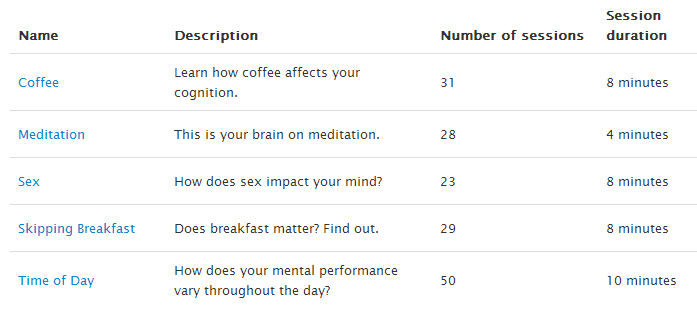Raising Your Kid’s IQ – What Science Tells Us
 If you were to carefully review the scientific studies of the things parents can do to boost their kids’ IQ what would you find? That is exactly what researchers as the NYU Steinhardt School of Culture, Education, and Human Development did and here is what they found:
If you were to carefully review the scientific studies of the things parents can do to boost their kids’ IQ what would you find? That is exactly what researchers as the NYU Steinhardt School of Culture, Education, and Human Development did and here is what they found:
Overall, the results of the meta-analyses indicated that certain dietary and environmental interventions can be effective in raising children’s IQ.
More specifically:
- Pregnant moms or newborn that eat foods rich in Omega-3 can boost IQ by 3.5 points
- Interactive reading or reading with your child boosts IQ by 6 points if they are 4 years old or less
- Going to preschools that includes a language component boosts IQ by 7 points.
Increases in IQ are approximate but these are meaningful improvements.
The researcher expect to uncover additional insights which I will blog about. In the meantime I am interested to hear from readers about specific ways to boost a kid’s IQ.
Categories: Cognitive Development, Diet, Training Tags:
Reading the Classics Lights Up Your Brain
 Interesting new research from Liverpool University claims that Reading Shakespeare has a Dramatic Effect on the Human Brain. Actually they found that reading any classic literature for example Shakespeare, Wordsworth, Elliot, Bard and others causes far more brain activation than the same content translated into plain language. The classic prose demands attention, occasionally stimulates self reflection and builds more mental muscle because the brain works harder.
Interesting new research from Liverpool University claims that Reading Shakespeare has a Dramatic Effect on the Human Brain. Actually they found that reading any classic literature for example Shakespeare, Wordsworth, Elliot, Bard and others causes far more brain activation than the same content translated into plain language. The classic prose demands attention, occasionally stimulates self reflection and builds more mental muscle because the brain works harder.
How does it work? One insight the researchers offer:
“By throwing odd words into seemingly normal sentences, Shakespeare surprises the brain and catches it off guard in a manner that produces a sudden burst of activity – a sense of drama created out of the simplest of things.”
A bit like a magic trick.
I am interested to hear from readers that enjoy the classics. Does the non-standard use of language stimulate your brain in a positive way?
Categories: Books, Cognitive Development Tags:
Is Turmeric a Super Brain Spice?
 Psychology today has an interesting post on the brain boosting effects of Curry. They claim over 4000 studies of Curry’s health benefits have been conducted over the last 10 years. General findings for brain function and cognitive performance are that Curry containing tumeric can:
Psychology today has an interesting post on the brain boosting effects of Curry. They claim over 4000 studies of Curry’s health benefits have been conducted over the last 10 years. General findings for brain function and cognitive performance are that Curry containing tumeric can:
decrease the risk of dementia, stimulate the grow of new brain cells, increase the production of neurotransmitters that support clear thinking and good moods and is being a strong antioxidant it will reduce inflammation that can harm brain cells.
The key ingredient in Curry that is doing the brain work is the turmeric, a spice you can buy in local your grocery store. The article goes on to suggest other spices to use it with and a recipe to try. For example, using turmeric with black pepper enhances absorption of the spice into your system by 2000%.
I am going to experiment with turmeric and try and find ways to include it in my daily diet. Besides curry-based meals there are for example turmeric teas, eggs, fries and salads to try and even special turmeric or curcumin supplements.
Categories: Cognitive Development, Diet, Mental Focus Tags:
Purpose Boosts Mental Performance & Brain Health
Studies at the Rush University Medical Center involving over 1000 subjects:
“…showed that people who reported greater purpose in life exhibited better cognition than those with less purpose in life even as plaques and tangles accumulated in their brains,” said Patricia A. Boyle, PhD.”
This is great news for anyone interested in improving cognitive performance or maintaining brain health as they age.
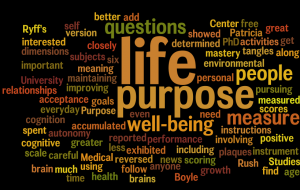 Purpose in life is determined by the meaning you get from everyday activities and how much of your time is spent pursuing goals that are important to you. It can be measured using Ryff’s well-being scale . The instrument measures well-being along six dimensions including autonomy, environmental mastery, personal growth, self acceptance, positive relationships with others and purpose in life. The questions that measure purpose in life are: 5,11,17,23,29,35 and 41. Be careful to follow the scoring instructions closely as the scores for some of the questions need to be reversed before you add them up.
Purpose in life is determined by the meaning you get from everyday activities and how much of your time is spent pursuing goals that are important to you. It can be measured using Ryff’s well-being scale . The instrument measures well-being along six dimensions including autonomy, environmental mastery, personal growth, self acceptance, positive relationships with others and purpose in life. The questions that measure purpose in life are: 5,11,17,23,29,35 and 41. Be careful to follow the scoring instructions closely as the scores for some of the questions need to be reversed before you add them up.
Categories: Cognitive Decline, Memory and Learning, Older Adult, Other, Problem Solving Tags:
Measure How Well Your Brain Works
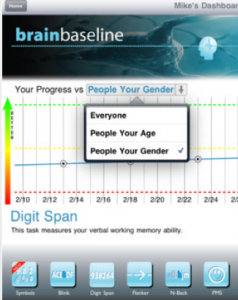 Cognitive Media has a free iPad application that takes you through a battery of scientific assessments of brain performance using game-like activities. There are over 14 assessments that:
Cognitive Media has a free iPad application that takes you through a battery of scientific assessments of brain performance using game-like activities. There are over 14 assessments that:
“…use the same laboratory analyses neuroscientists use to measure memory, attention, and processing speed, providing users with the ability to test their cognitive functioning.”
This is an excellent tool for any one interested in taking a systematic approach to improving brain function and cognitive performance. You can use it to periodically measure your attention, executive function, working memory, visual motor coordination, spatial processing and speed of processing. If the results improve you will have good evidence that your Next Brain efforts are paying off.
A version called Brainbaseline Pocket is due out for the iPhone. I plan on completing the assessments on that App and will blog about the results.
I am interested to hear from readers that have used Brainbaseline. How often to you re-take a given assessment to check for improvement?
Categories: Software Tags:
Measure Your Cognitive Performance
A reader found Quantified Minds , a web site offering the opportunity to participate in a variety of simple experiments designed to measure your cognitive performance. Experiments that are running now are shown below.
You can even design your own experiments. I am going to try a couple. I’m hoping the platform is flexible enough to test some of the ideas we have discussed on the Next Brain Blog. If so, I might ask you participate in an experiment.
Categories: Other Tags:
Exercise Boosts Brain In Proportion to Effort Made
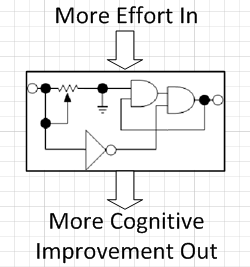 We have reported many times in the Next Brain Blog on scientific studies that suggest exercise improves brain function and cognitive performance. Now a new study led by the director of the Montreal Heart Institute suggests that the more exercise you do the more cognitive improvement you see. The study focused on overweight and inactive adults that were 49 years old on average. A summary of the results:
We have reported many times in the Next Brain Blog on scientific studies that suggest exercise improves brain function and cognitive performance. Now a new study led by the director of the Montreal Heart Institute suggests that the more exercise you do the more cognitive improvement you see. The study focused on overweight and inactive adults that were 49 years old on average. A summary of the results:
“After four months of high-intensity interval training, heart patients in Juneau’s study had markedly improved cognitive functions: the ability to think, recall, and make quick decisions. Even more exciting is that the study demonstrated that the more exercise patients could tolerate, the better their results—their minds became “sharper.”
While there is surely some limit to this effect, it does suggest that increasing the duration/intensity of your workout could lead to an increased brain boost.
Categories: Memory and Learning, Older Adult, Problem Solving, Training Tags:
Does Dental Hygiene Impact Brain Health?
 Can brushing your teeth, wearing dentures or otherwise taking care of your teeth and gums protect memory and brain health? One recent study suggests the answer is yes, and the impact can be significant:
Can brushing your teeth, wearing dentures or otherwise taking care of your teeth and gums protect memory and brain health? One recent study suggests the answer is yes, and the impact can be significant:
“It was found that men with inadequate oral hygiene habits who did not wear dentures had a 91% greater risk of dementia than those with adequate oral hygiene habits.”
The key health behaviors are regular brushing and visits to the dentist.
While more research in needed, this is the first study that I have seen that suggests dental health behaviors could be important to building or maintaining or your next brain.
I am interested to hear from readers about other studies. Are there other oral hygiene techniques we should consider as tools for improving brain function or cognitive performance?
Categories: Cognitive Decline, Lifestyle, Memory and Learning, Older Adult Tags:
Multivitamin Improves Memory in Older Men
 That is the conclusion of one study carried out on 51 men ages 50-74.
That is the conclusion of one study carried out on 51 men ages 50-74.
“The results showed multivitamin supplementation, compared to placebo, significantly improved recognition memory performance, although other cognitive function parameters did not differ between the treatment groups.”
The study goes on to suggest it might also help avoid age-related cognitive decline.
I am interest to hear from readers that use multivitamins to improve brain function or cognitive performance.
Categories: Cognitive Decline, Diet, Memory and Learning, Older Adult Tags: vitamins
National Brain Game Challenge Begins Today
For a $25 fee/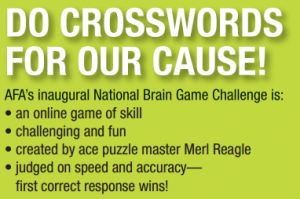 donation to the Alzheimer’s Foundation of America you can enter the National Brain Game Challenge. This is a chance to test your crossword puzzle solving abilities in an online game. There are two divisions (pro and public) with a $2500 first prize as well as other cash prizes in each division.
donation to the Alzheimer’s Foundation of America you can enter the National Brain Game Challenge. This is a chance to test your crossword puzzle solving abilities in an online game. There are two divisions (pro and public) with a $2500 first prize as well as other cash prizes in each division.
The foundation is sponsoring this contest to promote daily mental exercise as a way to help prevent the disease.
According to the website:
“Research suggests that regular mental activities might help reduce the risk of Alzheimer’s disease or other memory disorders by:
- enhancing cognitive reserve
- stimulating growth of new brain cells, and
- maintaining or strengthening connections between brain cells.”
I am interested to hear from readers that take the challenge or otherwise play crossword puzzles for fun and brain training.
Categories: Cognitive Decline, Other Tags:

